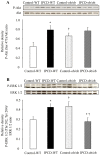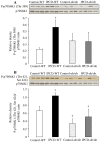Myocardial ischemic postconditioning against ischemia-reperfusion is impaired in ob/ob mice
- PMID: 18689499
- PMCID: PMC2759460
- DOI: 10.1152/ajpheart.00379.2008
Myocardial ischemic postconditioning against ischemia-reperfusion is impaired in ob/ob mice
Abstract
Ischemic postconditioning (IPCD) significantly reduces infarct size in healthy animals and protects the human heart. Because obesity is a major risk factor of cardiovascular diseases, the effects of IPCD were investigated in 8- to 10-wk-old leptin-deficient obese (ob/ob) mice and compared with wild-type C57BL/6J (WT) mice. All animals underwent 30 min of coronary artery occlusion followed by 24 h of reperfusion associated or not with IPCD (6 cycles of 10-s occlusion, 10-s reperfusion). Additional mice were killed at 10 min of reperfusion for Western blotting. IPCD reduced infarct size by 58% in WT mice (33+/-1% vs. 14+/-3% for control and IPCD, respectively, P<0.05) but failed to induce cardioprotection in ob/ob mice (53+/-4% vs. 56+/-5% for control and IPCD, respectively). In WT mice, IPCD significantly increased the phosphorylation of Akt (+77%), ERK1/2 (+41%), and their common target p70S6K1 (+153% at Thr389 and +57% at Thr421/Ser424). In addition, the phosphorylated AMP-activated protein kinase (AMPK)-to-total AMPK ratio was also increased by IPCD in WT mice (+64%, P<0.05). This was accompanied by decreases in phosphatase and tensin homolog deleted on chromosome 10 (PTEN), MAP kinase phosphatase (MKP)-3, and protein phosphatase (PP)2C levels. In contrast, IPCD failed to increase the phosphorylation state of all these kinases in ob/ob mice, and the level of the three phosphatases was significantly increased. Thus, although IPCD reduces myocardial infarct size in healthy animals, its cardioprotective effect vanishes with obesity. The lack of enhanced phosphorylation by IPCD of Akt, ERK1/2, p70S6K1, and AMPK might partly explain the loss of cardioprotection in this experimental model of obese mice.
Figures







References
-
- Ahima RS, Flier JS. Leptin. Annu Rev Physiol. 2000;62:413–437. - PubMed
-
- Argaud L, Gateau-Roesch O, Raisky O, Loufouat J, Robert D, Ovize M. Postconditioning inhibits mitochondrial permeability transition. Circulation. 2005;111:194–197. - PubMed
-
- Boengler K, Buechert A, Heinen Y, Roeskes C, Hilfiker-Kleiner D, Heusch G, Schulz R. Cardioprotection by ischemic postconditioning is lost in aged and STAT3-deficient mice. Circ Res. 2007;102:131–135. - PubMed
-
- Cai Z, Semenza GL. PTEN activity is modulated during ischemia and reperfusion: involvement in the induction and decay of preconditioning. Circ Res. 2005;97:1351–1359. - PubMed
-
- Camps M, Nichols A, Arkinstall S. Dual specificity phosphatases: a gene family for control of MAP kinase function. Faseb J. 2000;14:6–16. - PubMed
Publication types
MeSH terms
Substances
LinkOut - more resources
Full Text Sources
Medical
Molecular Biology Databases
Research Materials
Miscellaneous

